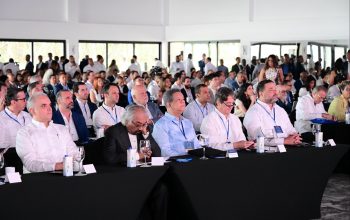news
Dr. Leonel Fernández Analyzes the Impact of the Global Structural Crisis at the Thirty-Forth Session of ECLAC
September 5, 2012
Dr. Leonel Fernández, former president of the Dominican Republic and President of Global Foundation for Democracy and Development (GFDD) and Fundación Global Democracia y Desarrollo (FUNGLODE), warned of the political and social implications associated with the measures being implemented to confront the global structural crisis, during the thirty-forth session of the Economic Commission for Latin America and the Caribbean, celebrated August 27-31, 2012 in San Salvador, El
Salvador.
In the quest to identify solutions, emphasized Dr. Fernández, two camps of thought have emerged: one focused on austerity, and one which focused on stimulating growth.
He argued that the global structural crisis has led to a crisis in political leadership, marked by electoral defeats among conservative and social democratic governments in Europe.
The former Dominican President led the roundtable discussion that took place
on Thursday, August 30, titled “Structural Change for Equality: An Integrated Approach to Development,” which featured a presentation by ECLAC Executive Secretary, Alicia Bárcena.
During his first intervention, Dr. Fernández affirmed that austerity measures applied in various countries in Europe have led to economic recession, aggravating problems of unemployment and the ongoing effects of the global economic crisis.
According to the former
president, the application of austerity measures is benefiting countries in Northern Europe such as Germany, Austria, Finland, Denmark and the Netherlands. This is due to the fact that devaluation of the euro has contributed to increased regional exports from these countries.
He indicated the countries of Southern Europe have been more affected, citing the cases of Spain, Portugal and Italy. He observed that the means by which market requirements are satisfied do not
matter. The reaction is always adverse, further exacerbating economic and social situations.
Dr. Fernández stated that in Europe, there are two camps that embody distinct schools of thought on how to come out of the crisis.
The former Head of State indicated that the social tensions are the result of policies of austerity, which generate greater levels of unemployment and under employment; massive housing evictions; and the implementation of flexible
labor policies that negatively impact the quality of life of the working class, the sector that is the most vulnerable and most affected by the crisis.
“These social tensions have had an impact on the electoral political map of Europe. Everyone that has served in government during this stage of the crisis has won by electoral landslides, irrespective of political ideology. “Social democracies have been felt the electoral impacts. Conservative governments, equally, have
been electorally pulverized by the economic crisis.
In addition to the panel led by Dr. Fernández on August 30, stakeholders also debated the subject “Global Crisis and Current Conditions in Latin America.” The roundtable featured interventions by Hugo Martínez, Minister of External Relations of El Salvador; Luciano Coutinho, President of Banco Nacional de Desarrollo Económico y Social de Brasil (BNDES) (National Bank of Economic and Social Development of Brazil);
José Antonio Ocampo, Professor of Professional Practice, Director of the Economic and Political Development Concentration at the School of International and Public Affairs at Columbia University; and David Ibarra, Professor of Finance and Economics at Universidad Nacional Autónoma de México (UNAM).
The roundtable “Structural Change, Productivity and Employment” was presided over by Armando Flores, Minister of Economy of El Salvador, and included presentations by
Temístocles Montás, Minister of Economy, Planning and Development of the Dominican Republic; René Castro, Minister of Environment, Energy and Telecommunications of Costa Rica; Pavel Centeno, Minister of Public Finance of Guatemala; Rafael Pardo, Minister of Labor of Colombia; Dwight Venner, President of the Eastern Caribbean Central Bank; Fander Falconí, National Secretary of Planning and Development of Ecuador; Mariano Laplane, President of the Center of Management and Strategic Studies of
Brazil; and Marta Susana Novick, Subsecretary of Technical Programming and Labor Studies of Argentina.
The roundtable “Cycle Dynamics and Long Term Growth” was presided over by Carlos Cáceres, Minister of Treasury of El Salvador, and included presentations by Hernán Lorenzino, Minister of Economy and Public Finance of Argentina; Jeannette Sánchez, Minister of Economic Policy Coordination of Ecuador; Fernando Lorenzo, Minister of Economy and Finance of Uruguay; Ashni Kumar
Singh, Minister of Treasury of Guyana; Luis Arce, Ministry of Economy and Public Finance of Bolivia; Luis Fernando Carrera, Secretary of Planning and Programming of the Presidency of Guatemala; Vanessa Petrelli, President of the Institute of Applied Economic Research (Investigación Económica Aplicada, IPEA) of Brazil; and Carlos Gerardo Acevedo, President of the Central Reserve Bank of El Salvador.
The roundtable “The Social Face of Structural Change: From Vicious
Circles to Vicious Circles” was presided over by Vanda Pignato, Secretary of Social Inclusion and First Lady of El Salvador, and included presentations by Isis Ochoa Cañizalez, Minister of Popular Power for Municipalities and Social Protection of Venezuela; Joaquín Lavín Infante, Minister of Social Development of Chile; Aloizio Mercadente Oliva, Minister of Education of Brazil; Juan Pablo Silva Macher, Vice Minister of Social Policy and Evaluation of Peru; and Alberto Guevara, President of
the Central Bank of Nicaragua.
Related links:
http://www.eclac.cl/cgi-bin/getProd.asp?xml=/prensa/noticias/comunicados/4/47914/P47914.xml&xsl=/prensa/tpl-i/p6f.xsl&base=/prensa/tpl-i/top-bottom.xsl
http://www.eclac.org/






